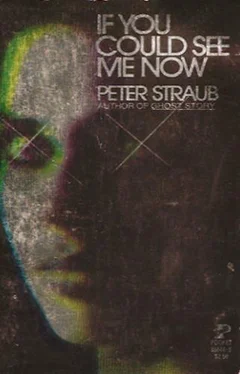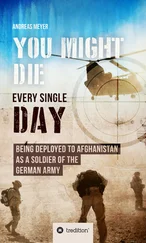I said, “It’s not me, Polar Bears.”
He just sat there blinking, feigning polite attention. When I said no more, he folded his hands into his lap. “Now, we both know who it isn’t, don’t we, Miles? I had a talk with your prime suspect yesterday. He told me that those Coke bottles came from Duane’s cellar, where you could get at ‘em pretty easy, and he says you threw out that doorknob yourself. They were Duane’s. Says he doesn’t know how they got in his truck. And I know he hasn’t been up in the woods at night, because he confessed to me what he’s been doing with his nights.” He smiled again. “He and Duane’s girl used to go down to that shack behind Andy’s. Do pokey-pokey all night. Paul Kant sort of ruined their fun.”
“Nobody living is the one you want,” I said.
He squinted up his entire face, then let out a disgusted grunt and put his hat back on his head. “Miles, if you go crazy on me you’re gonna ruin all the fun.” On went his sunglasses. He pushed himself off the fender. He looked like something you’d run from on a dark night. “Why don’t you take a little trip with me?”
“A trip?”
“A little jaunt. I want to show you something. Get into my car.”
I just looked at him, trying to figure it out.
“Get your ass in the car, Miles.”
I did as I was told.
He spun the squadcar out onto the highway without speaking to me, his face a tight mask of distaste. All of those unhappy odors began to build up. We went toward Arden at a good twenty miles over the speed limit.
“You’re taking me to her parents,” I said.
He did not reply.
“You finally decided to arrest me.”
“Shut up,” he said.
But we did not stop at the police station. Polar Bears zoomed straight through Arden, and we picked up more speed as we left town. Restaurants, the bowling alley, fields. The farms and the corn took over again. Now we were in the same country he had driven me through before, the afternoon I had talked to Paul Kant: wide fields green and yellow, and the Blundell River shining through a screen of trees. Eventually Polar Bears took off his hat and sailed it onto the back seat. He ran a palm over his forehead. “Too damn hot,” he said.
“I still don’t get it. If you were going to work me over you could have done it miles back.”
“I don’t want to hear your voice,” he said. Then he glanced over at me. “Do you know what’s in Blundell?”
I shook my head.
“Well, you’re gonna find out.”
Exhausted-looking cows swung their heads to watch us pass.
“The state hospital?”
“Yeah, that’s there.” He would say no more.
Hovre hit the accelerator even harder, and we sped past the sign at the Blundell town limits. It was a town much like Arden, one main street lined with stores, wooden houses with porches on a small grid of streets. Lightbulbs on a string and a row of banners hung before a used-car lot, the banners too limp to flap. A few men in straw hats and working clothes squatted on the curb.
Polar Bears took the first road out of town, and then guided the patrol car into what looked like a park. The road turned narrow. It was edged with a long green lawn. “State hospital grounds,” he said noncomittaly. “But you and me ain’t going there.”
I could see the big gray buildings of the hospital complex appearing through the trees to my left. They had a Martian remoteness. Sun umbrellas dotted the lawn, but no one sat beneath them.
“I’m gonna do you a real favor,” he said. “Most tourists never get to see this feature of our county.”
The road divided, and Polar Bears turned into the left fork, which soon ended in a gray parking lot before a low gray building like an ice cube. Shrubs around the sides of the cube struggled in the hard clay. I realized where I was a half second before I saw the metal plate staked into the ground in the midst of the shrubs.
“Welcome to the Furniveau County Morgue,” Polar Bears said, and got out of the car. He went across; the tacky asphalt of the lot without looking back at me.
I reached the door just as it closed behind him. I pushed it open and stepped into a cold white interior. Machinery hummed behind the walls.
“This here’s my assistant,” Polar Bears was saying. I realized after a moment that he meant me. He had his sunglasses off, and he rested his hands on his hips. In the antiseptic cold interior of the morgue, he smelled like a buffalo. A short dark-complected man in a spotted white coat sat at a battered desk in an alcove and incuriously looked at him. The desk was bare except for a portable radio and an ashtray. “I want him to have a look at the new one.”
The man glanced at me. It didn’t make any difference to him. Nothing made any difference to him.
“Which new one?”
“Michalski.”
“Uh huh. She’s back from the autopsy. Didn’t know you had any new deputies.”
“He’s a volunteer,” said Polar Bears.
“Well, what the hell,” the man said, and pushed himself away from the desk. He went through green metal doors at the end of the hall. “After you,” said Polar Bears, waving me through.
It was useless to protest. I followed the attendant down a cold row of metal lockers. Hovre followed, so close that he nearly walked on my heels.
“You braced for this?” he asked me.
“I don’t see the point,” I said.
“You pretty soon will.”
The dark-complected man stopped before one of the lockers, took a ring of keys from his pocket, and unlocked the door.
“Belly up,” said Polar Bears.
The little man pulled the long tray out of the locker. A dead naked girl was lying on the slab. I had thought they covered them with sheets. “God,” I said, seeing her wounds and the scars from the autopsy.
Polar Bears was waiting, very still. I looked at the girl’s face. Then I began to perspire in the icy room.
Polar Bears’ voice came: “She remind you of anybody?”
I tried to swallow. It was more than enough proof, if I needed any more proof. “Did the first two look more or less the same?”
“Pretty close,” said Polar Bears. “That Strand girl was as close as a sister might be.”
I remembered the violence of the hatred I had felt when she had seemed to storm inside me. She had come back all right, and she had killed three girls who had an accidental resemblance to her. I would be next.
“Interesting, isn’t it?” said Hovre. “Close ‘er up, Archy.”
The dark little man, who had been standing with his arms braced against the front of the locker as if asleep on his feet, pushed the tray back into the locker.
“Now let’s go back to the car,” said Polar Bears.
I followed him out into the blast of heat and sunlight. He drove me back to the Updahl farm without saying a word.
After he turned up the drive he cut the patrol car onto the lawn before the porch and got out as I did. He came toward me, a big intimidating physical presence. “Suppose we just agree to stay put until I get the final word from the M.E.”
“Why don’t you put me in jail?”
“Why, Miles, you’re my assistant on this case,” he said, and got back into his car. “In the meantime, get some sleep. You look like hell.” As he twirled the car into the drive, I saw the grim, entirely satisfied smile on his lips.
I woke up late in the night. Alison Greening was seated on the chair at the foot of the bed. I could just distinguish her face and the shape of her body in the moonlight. I feared — I do not know what I feared, but I feared for my life. She did nothing. I sat up in the bed: I felt terribly naked and unprotected. She seemed utterly normal; she looked like an ordinary young woman. She was looking straight at me, her expression placid and unemotional, abstracted. For a moment I thought that she looked too ordinary to have caused all the upheavals in me and in Arden. Her face was waxen. Then my fear came booming back into me, and I opened my mouth to say something. Before I could form words, she was gone.
Читать дальше












